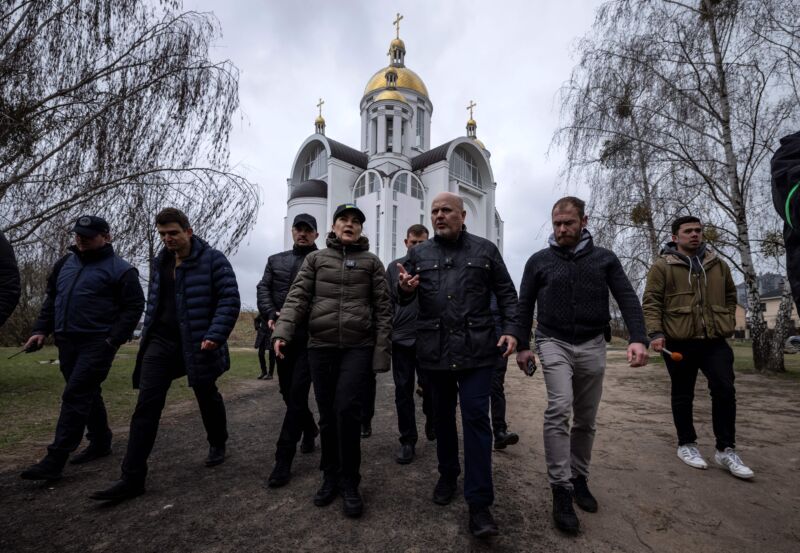
TikTok is resisting calls to preserve and hand over access to its content for war crime investigations, as lawyers and activists warn that the Chinese-owned app is a major data challenge in prosecuting atrocities in Russia’s invasion of Ukraine.
The video app’s popularity with young Ukrainians and Russians posting footage of the war has made it a trove of digital intelligence that investigators are attempting to mine and archive as evidence of war crimes, crimes against humanity, and illegal acts of violence in Ukraine.
TikTok, owned by Chinese tech giant ByteDance, has been criticized for being slow to respond to requests for product changes that allow the video app’s content to be archived and verified more easily, as well as better access to TikTok’s platform for members of civil society.
“There is a lot of suspicion of engaging with TikTok because of its origins, and I think rightfully so. I have concerns about the security of data there, and it is not fully clear where the interest and influence in the company is coming from,” said Dia Kayyali, associate director for advocacy at Mnemonic, a nonprofit that archives digital documentation of human rights violations. “It is especially concerning that China could directly have access to that data.”
So far, China has refused to condemn Russia for invading Ukraine and backed Moscow’s complaints about NATO expansion. TikTok has admitted it has censored content critical of China in the past, including references to Tiananmen Square, for instance. TikTok says it no longer blocks content based on political sensitivities.
“I haven’t gotten any follow-up and it’s very frustrating. TikTok’s processes are just not developed, and they do not have it figured out,” said Kayyali, who met with TikTok earlier this year.
It comes as TikTok struggles to balance the swift removal of posts showing graphic violence or misleading content with the preservation of potential evidence for human rights trials.
“TikTok is one of the newest in the game, and it’s one of the hardest platforms, from a data collection standpoint, because their [sharing mechanisms] are not as rich as, say, Twitter or Facebook,” said David Hasman, who oversees data analysis at the International Criminal Court, which is one of several international institutions and countries that have launched human rights investigations in Ukraine.
“The way that TikTok stores data is much different, and where they store their data, in which countries, obviously is also a lot different. I would say it’s probably one of the biggest challenges,” he added, referring to TikTok’s Chinese ownership.
Since early 2022, TikTok has met with human rights lawyers, activists, and others involved in Ukraine war crime investigations. However, it has yet to introduce any changes to its process or the product itself.
Criminal prosecutors are increasingly relying on social media posts from TikTok and others as a way to “bring the crime scene to the courtroom,” said Karim Khan, chief prosecutor of the ICC.
“Any effective investigation anywhere in the world now really requires a very effective harnessing of social media,” said Khan. “People... recording killings or attacks or the consequences of attacks in real time, it can have absolutely fantastic probative value.”
Experts say TikTok is particularly challenging to archive from, compared to its more mature competitors such as YouTube or Facebook, because it is prone to video and audio editing and remixing, it has non-chronological newsfeeds, and when inappropriate content is removed by the company, nearly 90 percent is deleted before anyone sees it.
“The consequences for legal investigations is that it is very difficult to verify the content. And how will investigators request information if they don’t know it ever existed? This can have a catastrophic effect for justice for human rights abuses,” said Raquel Vázquez Llorente, head of law and policy at the nonprofit Witness and an international criminal lawyer who works at the intersection of technology and human rights.
The ICC’s Khan declined to confirm if it had officially asked TikTok to provide evidence from Ukraine but said, “When we know that there are investigations going on, like we did in Iraq, we could also petition the courts... to preserve that evidence.”
He added, “Clearly on all platforms, there is potential evidence. Over the life of the court, we have sought to have access to information from states and from corporations. And that will continue, but every company, like every state, will have its own approach to the importance of co-operation.”
TikTok said it regularly meets with organizations, government bodies, and third-party experts to gather feedback and is committed to cooperating with law enforcement while respecting the privacy of its users.
© 2022 The Financial Times Ltd. All rights reserved. Not to be redistributed, copied, or modified in any way.
reader comments
52